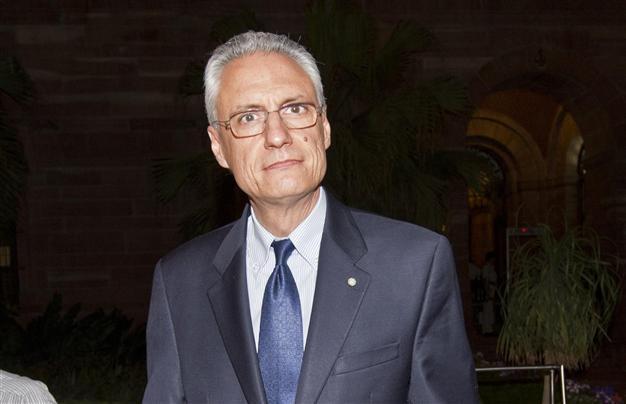Italian envoy to India 'has no immunity': court
NEW DELHI - Agence France-Presse

In this photograph taken on March 12, 2013, Italian Ambassador to India Daniele Mancini exits the Ministry of External Affairs offices in New Delhi. AFP Photo
India's top judge said Monday that Italy's ambassador had forfeited his diplomatic immunity over his role in securing the release of two marines who skipped bail while on trial for murder in New Delhi.Chief Justice Altamas Kabir said Daniele Mancini, who had negotiated the Italians' release last month so they could vote in an election, had waived his immunity by giving an undertaking to a court that the pair would return.
"A person who comes to court and gives an undertaking has no immunity," Kabir told a hearing, while ordering that the ambassador stay in India until the next hearing on April 2.
Massimiliano Latorre and Salvatore Girone, who are accused of murdering two Indian fishermen last year, had been given permission to fly to Italy to cast their votes on the understanding that they would return.
But the Italian government announced last week that it would renege on its commitment to send the men back, prompting fury in New Delhi.
The Indian government has warned of "consequences" and is reviewing its ties with Italy, while the legally complex case is being watched careful by India's allies because it could set precedents over the treatment of foreign diplomats.
New Delhi has put its airports on alert to prevent Mancini leaving the country and the Supreme Court issued instructions that "appropriate steps" should be taken to restrain him.
A lawyer for the Italian government argued that Mancini enjoyed diplomatic immunity and freedom of movement under international rules contained in the Vienna Convention.
"We have lost all trust in the ambassador," replied Kabir, who was heading a three-judge bench.
India's foreign ministry has also argued that Mancini may have waived his immunity by willingly submitting himself to the jurisdiction of the Supreme Court by signing a personal affidavit guaranteeing the return of the marines.
Without legal protection, he could be prosecuted for contempt of court.
The marines face murder charges in India after shooting dead two fishermen off India's southwestern coast in February last year when a fishing boat sailed close to the Italian oil tanker they were guarding. They say they mistook the fishermen for pirates.
Italy insists the marines should be prosecuted in their home country because the shootings involved an Italian-flagged vessel in international waters, but India says the killings took place in waters under its jurisdiction.
Relations between the two countries have also been soured by corruption allegations surrounding a $748 million deal for the purchase of 12 Italian helicopters which the Indian government is now threatening to scrap.
The case caused more uproar in the local assembly of southwestern Kerala, the home state of the dead fishermen.
The opposition Communist party walked out of the assembly after their demand for an urgent discussion on how the Italian marines had been allowed to return home was dismissed by the ruling party.
"It's a shame on India that this case was dealt with casually," senior Communist leader P.K. Gurudasan told AFP.
















